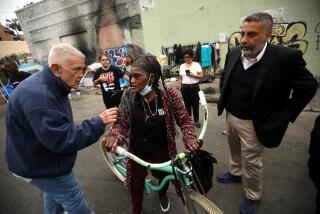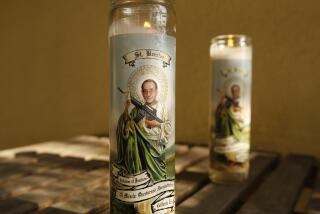Richard Fildew; Innovative Judge
- Share via
Richard C. Fildew, former Los Angeles Superior Court and Pasadena Municipal Court judge who devised innovative punishments such as having traffic offenders donate blood rather than pay fines or go to jail, has died. He was 87.
Fildew died Sunday in his native Pasadena.
In 1955, shortly after he was appointed to the Pasadena bench, Fildew demonstrated his singular approach to solving problems by offering the blood-donation penalty. He said it would solve a perennial Traffic Court problem of what to do with offenders too poor to pay fines or serve jail terms without causing family hardship. So he provided a choice: Give blood or pay up or serve time.
“If he says ‘Yes,’ I’ll give him a future court appearance date,” Fildew told The Times, “telling him to return to court on that date with the Red Cross blood donor’s certificate, the amount of his fine or his toothbrush.”
The alternative penalty was voluntary, he stressed, adding: “Nobody will be forced to donate blood.”
After graduating from Pasadena City College and Southwestern School of Law, Fildew established his law practice in Los Angeles in 1938. Also involved in politics, he was elected president of the Young Republicans of Los Angeles County in 1942 and of the Young Republicans of California in 1944.
In 1949, he led a groundswell movement to urge then-Lt. Gov. Goodwin J. Knight to run for governor. Six years later, Gov. Knight appointed Fildew to the Pasadena court and in 1957 to the Superior Court.
During his 20-year tenure on the countywide trial court, Fildew presided over major civil cases governing nude dancing in public bars and short-weighting of consumer products such as packaged bacon.
Fildew is survived by his wife, Patricia; three sisters, Peggy Stanton, Moya Henderson and Denise Walker, and two stepchildren, Marc and Medina.
Funeral services are scheduled today at 2 p.m. at Cabot & Sons Chapel in Pasadena. The family has asked that, instead of flowers, donations be made to a charity of the donor’s choice.
More to Read
Sign up for Essential California
The most important California stories and recommendations in your inbox every morning.
You may occasionally receive promotional content from the Los Angeles Times.










